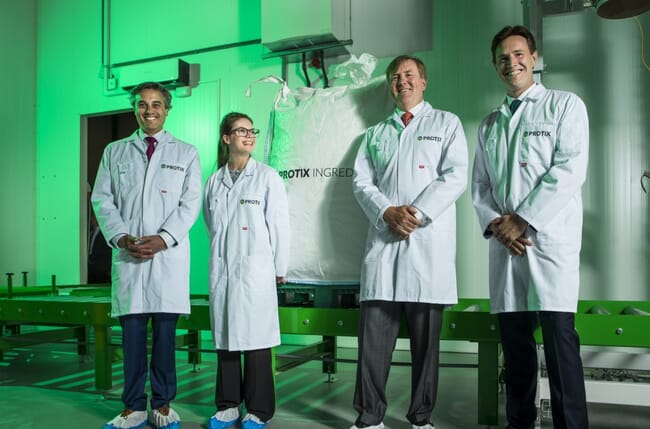
Protein from these can be used in aquafeeds as an alternative to fishmeal or soy protein concentrate © Protix
The LCA was undertaken by the Deutsches Institut für Lebensmitteltechnik (DIL) on ingredients produced by Protix*. Highlights of the LCA, a commonly accepted way of evaluating the effects that a product has on the environment over the entire period of its life, include:
- ProteinX insect meal (at 1.149 kg CO2 equivalent) has almost a seven-fold lower CO2 footprint than the soy protein concentrate (at 7.5 kg CO2 equivalent) often found in livestock and aquafeeds.
- Each kilogram of ProteinX reduces water consumption by 330 litres (190 litres vs 520 litres for soy protein concentrate.
“As people become increasingly aware of environmental issues such as deforestation, water scarcity, global warming and loss of biodiversity, and demand more sustainable products, the challenge facing feed, pet food and plant producing companies is to lower their environmental footprint while maintaining the taste and health benefits of their formulations,” states Protix in a press release.
“Protix’s insect-based ingredients are delivering on their promise to provide a more sustainable solution with outstanding palatability and performance. The DIL study shows that land and water use, as well as CO2 emissions, are considerably lower for Protix’s insect-based ingredients than common ingredients such as soy protein concentrate, palm kernel oil or fishmeal,” the company adds.
Kees Aarts, CEO and joint founder of Protix, adds: “We are delighted that these LCA findings confirm the sustainability of our products. Following the opening of our first-in-world 14,000 m2 production facility in the Netherlands in 2019, we are now in a position to build on our results and expand internationally. With new international production plants, we are confident of achieving even better sustainability results.”
The company adds that: “The black soldier fly in particular is one of nature’s most efficient composting ‘machines’. The flies have a voracious appetite, and can turn organic waste into valuable biomass very fast, and with a low impact on resources: one tonne of insects can be grown in 14 days using a land area of only 20 m2 . Because the mature black soldier fly does not eat, as larvae they are very efficient at storing nutrients. Finally, they can be farmed in a local and circular production process close to where they are needed, thus reducing transport.”
*Protix, like Hatch, is part of Aqua-Spark's investment portfolio but The Fish Site retains editorial independence.


